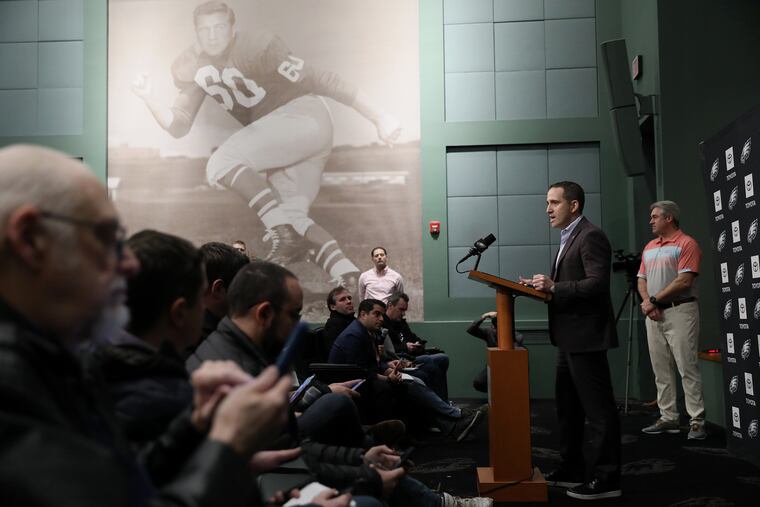Howie Roseman’s bill for Eagles’ Super Bowl win has come due | Bob Ford
For every fan, or team official, who said he or she would trade years of heartache for one blissful season of fulfillment, well, welcome to the payment portion of that bargain.

Howie Roseman didn’t come out and say it directly – in fact, he didn’t say much of anything directly during his Wednesday elegy for the Eagles season – but the takeaway was that if you liked the way 2017 ended, then what has followed must be accepted as a predictable byproduct.
His is a very reasonable argument, too. The Eagles swung big to trade resources in the process of drafting Carson Wentz, and in making other important acquisitions. They swung big in signing free agents. They constructed a team that was pricey, a touch old, and, at the expense of the near-term future, built to win right away.
Son of a gun, it actually worked. It worked in a weird way, of course, but it worked. In some alternate universe, the Falcons were able to score on that first-and-goal opportunity at the end of the divisional round game, and the whole dream never happened, but for once in recent franchise history, that wasn’t their fate. They ran all the lights, even the yellows, and finished by spinning victory doughnuts on the floor of U.S. Bank Stadium.
For every fan, or team official, who said he or she would trade years of heartache for one blissful season of fulfillment, well, welcome to the payment portion of that bargain.
“When we look at our team from 2017 to 2019, we knew that we had one team. Really, a team that we were basically going to stick with,” Roseman said Wednesday. “We didn't have a lot of resources in terms of draft picks. That's on me. We made trades for some veteran players to go win. We stick to that. We're glad of those decisions.”
That portion of the plan is over, however, according to Roseman. The Eagles, projected to have 10 draft choices in April, need to get younger and the median salary needs to get significantly lower if the team wants to improve (and pay) its top-end talent.
It will be a neat trick to do that and remain competitive, or somehow leap from being merely competitive to true contender status. Roseman would never cop to this, but it is possible everyone in the organization understands there will have to be at least one course-correction season that isn’t very productive.
But another season of patch-and-fill with what they can afford isn’t a very appetizing option, either, and unless the front office rips off the bandage at some point, Wentz will be sentenced to a career of 9-7 seasons much like the two most recent.
Roseman made it clear the team wasn’t as aggressive prior to the trade deadline as he would have liked, but only because the circumstances precluded that.
“Because of the resources we had … we were trying to find what were the undervalued markets, and so when you talk about the older guys, when you go into free agency, a lot of times the guys that are 26 and 27, kind of what we did in 2016 with Brandon [Brooks] and Rodney [McLeod], those guys are getting top-of-the-market [contracts],” Roseman said.
The Eagles picked through the bargain bins – the “undervalued markets,” in Roseman’s parlance – and weren’t able to do more than just window-shop when defensive backs Jalen Ramsey and Minkah Fitzpatrick were available.
Building through the draft is a smart way to create the chassis of your roster, but it isn’t quick, and it does require that one be able to choose the right players. That’s the real rub, and while Roseman dodged around the question, there’s no denying that two recent high cornerback picks – Sidney Jones in the 2017 second round, Rasul Douglas in the third round of the same draft – didn’t play a defensive snap on Sunday.
“I think [if] we look at all the teams that are still playing now, they have missed on picks, high picks. Everyone is going to miss on them,” Roseman said. “We don’t want to, [so] you have to increase your volume to give yourself a better shot.”
The 10 picks that Roseman will have to play with this year, assuming all the projected compensatory picks come to fruition, are equal to the total number of players drafted in 2018 and 2019. If the projections are correct, seven of those picks this year will be among the first four rounds.
That makes the 2020 draft, and how those draft assets are spent, vital to Roseman’s vision of rebuilding on the fly and not suffering a dropoff on the field. His philosophy of compiling as many draft picks as possible – providing better odds of hitting the mark – only went out the window once, and that was to land the franchise quarterback.
God bless fate and the Atlanta Falcons, it worked. The team Roseman put together was even strong enough to win without that quarterback. That was then, however, and this is now. The alarm clock has struck on that team, and the Eagles are now going back to the basics. It is going to be a messy offseason of unloading the past, far messier than most would imagine.
There’s no question the job has to be done, only whether Howie Roseman is the guy who can do it. Give him this much: He’s 1-for-1 on creating championship runs, and that’s a better record than most.